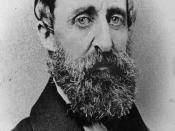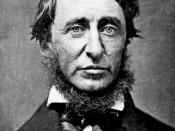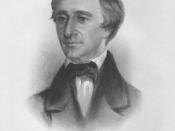Transcendentalist View of Bartleby the Scrivener Actions The Transcendentalists and the Dark Romantics were the two major literary groups of America's literary coming of age. The transcendentalists believed in transcending everyday, physical human experiences and objects, in order to determine the reality of God, the universe, and the self. Transcendentalists, led by Ralph Waldo Emerson and Henry David Thoreau, believed in the good of man, and held a very optimistic view of the world and mankind. This directly clashed with the Dark Romantics; they felt that everything had a darker, more evil side, and the depravity of man. Nathaniel Hawthorne, Edgar Allen Poe, and Herman Melville were the leading men of the Dark Romantics. Although both sides shared the same Romantic beliefs, they differed greatly on their views of the goodness of man. This clash in belief results in distinguishable differences in the texts of both sides, yet each one can be applied to the other.
Bartleby, of Bartleby the Scrivener, exhibited many transcendental qualities and the l results of those beliefs; therefore, the Transcendentalists would view Bartleby as one of their own kind.
The Transcendentalists wanted to get away from the corruption and dirtiness of the city to the innocence and universe-revealing qualities of the countryside. The reader is led to believe that Bartleby is a pathetic man because of the dehumanization effects of the city. Transcendentalist felt that the city was bad-human beings in it can only be harmed. Bartleby had the potential to be a great man. Perhaps he was, in his own right, but society never got to see it. The job of a scrivener is repetitive and monotonous. "With consistency a great soul has nothing to do," remarked Ralph Waldo Emerson. Bartleby's job was consistent, and there seemed to be no change,


